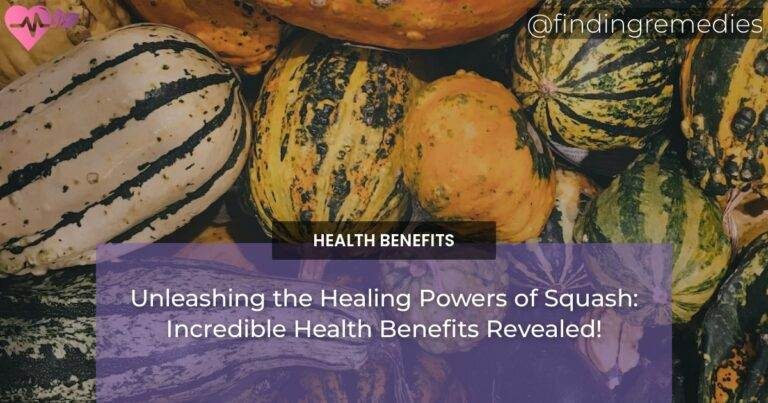Health Benefits of Squash: Using Foods as Medicine
Squash is a nutritious and delicious vegetable that has been used for centuries as a natural remedy for various ailments. This article will explore the numerous health benefits of squash, its nutritional profile, natural compounds, types and varieties, cooking methods, storage, and how it can be used to prevent and treat diseases.
Nutrition Profile of Squash
Squash is a low-calorie vegetable that is high in essential nutrients such as antioxidants, vitamins, minerals, and fiber. It is an excellent source of carotenoids, phytochemicals, and other natural compounds that promote optimal health.
The following are some of the essential nutrients found in squash:
- Potassium
- Magnesium
- Folate
- Vitamin C
Natural Compounds in Squash
Squash is rich in natural compounds that have numerous health benefits. These include antioxidants, carotenoids, and phytochemicals that enhance the immune system, promote weight loss, and prevent chronic diseases such as diabetes, cardiovascular disease, inflammation, and cancer.
Types and Varieties of Squash
There are several types and varieties of squash, including butternut, acorn, spaghetti, and pumpkin. Each type has a unique nutritional profile and health benefits. For instance:
- Butternut squash is rich in vitamin A and C, potassium, and fiber.
- Acorn squash is an excellent source of vitamin C and potassium.
- Spaghetti squash is low in calories and carbohydrates and is an excellent source of fiber.
- Pumpkin is rich in beta-carotene, vitamin C, and potassium and has anti-inflammatory properties.
Health Benefits of Squash
Squash has several health benefits due to its rich nutrient profile and natural compounds. Some of the benefits include:
- Immune system boost
- Weight loss and management
- Reduced risk of diabetes
- Improved cardiovascular health
- Anti-inflammatory properties
- Cancer prevention and treatment
Effects of Cooking on Squash
The cooking method used for squash can affect its nutritional value. Boiling, microwaving, or baking can lead to nutrient loss, while steaming or roasting retains the most nutrients.
Proper Storage of Squash
To retain the maximum nutritional value of squash, it is essential to store it properly. Keep squash in a cool, dry place away from direct sunlight, and do not store it next to fruits that release ethylene, such as apples and bananas.
Healing Diseases with Squash
Squash has several healing properties that make it useful in preventing and treating various diseases. Some of the diseases that can be prevented or treated with squash include:
- Diabetes
- Cardiovascular disease
- Inflammation
- Cancer
Risk Factors, Disadvantages, and Advantages of Squash
While squash is generally considered safe and healthy, some individuals may be allergic to it. Additionally, individuals who take blood thinners should be cautious about consuming squash due to its high vitamin K content. However, the advantages of consuming squash as a medicinal food far outweigh the disadvantages, and it can be a useful addition to a healthy diet.
Are the Health Benefits of Butternut Squash Similar to Other Varieties of Squash?
Yes, the healing powers of butternut squash are similar to other varieties of squash. Butternut squash is rich in vitamins, minerals, and antioxidants that can promote good health. It supports heart health, aids in digestion, boosts the immune system, and may even reduce the risk of certain chronic diseases.
Are the Health Benefits of Butternut Squash Different from Other Varieties of Squash?
Butternut squash is renowned for its healing powers of butternut squash. Its high levels of vitamin A, potassium, and antioxidant properties set it apart from other squash varieties. These nutrients support healthy vision, bone strength, and a strong immune system. Butternut squash is truly a nutritional powerhouse.
Conclusion
Squash is a nutritious and versatile vegetable that can be used to prevent and treat various diseases. Its rich nutrient profile and natural compounds make it an excellent food to incorporate into a healthy diet. By consuming squash regularly, individuals can improve their overall health and well-being.

